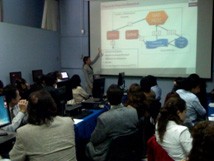
As one of the first developing countries to commit to specific goals to combat climate change, Mexico has implemented the Special Program on Climate Change (PECC in Spanish), which aims to reduce emissions by 51 billion metric tons of CO2 per year by 2012 . To achieve this ambitious goal, Mexico's Ministry of Environment (SEMARNAT) assumed responsibility for gathering and processing data from government agencies with climate change commitments . This task posed two key challenges: 1) developing a functional online reporting system that numerous and diverse public sector institutions could use; and 2) facilitating coordination among those institutions submitting data.
In response to these challenges USAID provided the link between the environment ministry and technical experts with experience developing reporting systems for the U.S. Environmental Protection Agency. Together, the parties were able to design a new online system that both adapts to Mexico's needs and allows users to report progress and calculate emissions reduction impacts using internationally recognized methodologies. The first version of the PECC Reporting System went live in September 2010. Subsequently, USAID worked with SEMARNAT to develop and make available a user's guide and training sessions for the Mexican Office of Climate Change Policy and representatives from participating federal agencies.
T'he PECC monitoring system represents not only a technical benchmark for developing countries, but also a significant advance in inter-agency cooperation within the Mexican Government. In this regard, the USAID Competitiveness Program also served as a catalyst for unprecedented intra-governmental cooperation in data reporting.
As a result of the PECC reporting System, the Mexican Government can now systematically produce and document key information on its climate change goals, which enhances its credibility within the international community. The PECC monitoring system is also a prime example of the U.S. Government working hand-in-hand with developing countries to support the achievement of their climate change goals.







Comment
Make a general inquiry or suggest an improvement.